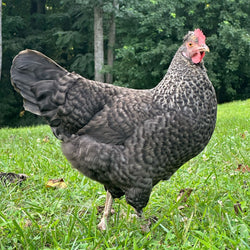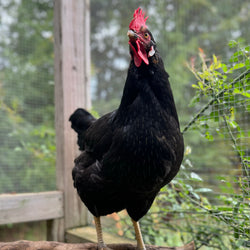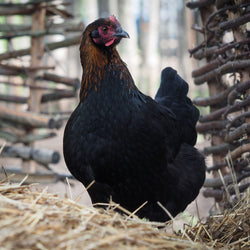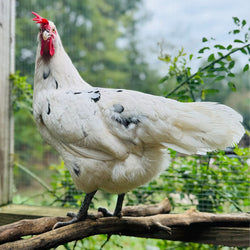f=menu&page=6/--
Frequently Asked Questions
Here we answer the most commonly-asked questions about ordering, chicken care, and more.
What are "reportable diseases" when it comes to chickens?
Reportable diseases are chicken illnesses that are serious and communicable enough that in the U.S., you (and your vet) are required to report incidences to the National Animal Health Reporting System. Typically, these are illnesses that are very contagious, not only within your own flock, but may also travel from flock to flock in the air, or by wild birds and so on. They are difficult to control, often fatal, and may leave survivors as carriers. Below is an overview , a list of the reportable diseases in the US that affect chickens. You'll want a veterinarian's diagnosis to be...
Read MoreChick illnesses and issues (overview)
When you're worried your new baby chicks are ill, there are a number of things that could be responsible! Here's a quick overview of the most common illnesses, conditions, and issues that may cause you concern with your new baby chicks. It is not an exhaustive list. Please click on the links for more details about each. Illnesses and conditions common to baby chicks Aspergillosis, or brooder pneumonia - Primary symptoms of this illness are respiratory. Brooder too hot or too cold - If chicks are too hot, they'll be as far from the heat source as possible and may...
Read MoreChicken illnesses with respiratory symptoms (overview)
When your chicken is showing respiratory symptoms, there are a number of chicken illnesses that could be causing the problem. We know how worrisome it can be when a pet chicken is sick! Respiratory symptoms in chickens can present as wheezing/whistling/rattling breath, watery or bubbly eyes, gasping, sneezing, blocked nares/nostrils, coughing, panting, head shaking (to try to clear the nares/nostrils), swollen face/eyes (indicating some swelling in the sinus passages), coughing blood, choking, and darkened comb/wattles (from not enough air). We've included here a quick overview of the most common chicken illnesses that cause respiratory symptoms, but understand that each illness...
Read MoreHow can I tell if my chicken has frostbite?
Cold weather can put your chickens at risk for frostbite, especially on their combs, wattles, and feet. Learn how to recognize the early signs, prevent severe damage, and treat affected birds safely. With proper coop ventilation, roosting space, and a few simple precautions, you can keep your flock warm and healthy all winter long.
Read MoreWhen should I take my pet chicken to the vet?
As keepers of pet chickens, we've all been there. You notice one of your birds exhibiting some unusual behaviors or symptoms, and you're faced with a dilemma: What do you do? What is causing the symptoms and how can you help? Is what you're seeing normal chicken behavior, a minor issue that may resolve itself, or serious problem that warrants a professional help? Let's be honest: You don't want to pay a big vet bill only to find out it's nothing serious, but you also don't want to assume it's nothing serious and have it turn out to be something...
Read MoreCan I get Coronavirus (COVID-19) from my chickens?
Here's what the CDC says about COVID-19, as of November 2021: The risk of animals spreading the virus to people is low; the virus can spread from people to animals during close contact. More studies are needed to understand how different animals could be affected by the virus; people with the virus should avoid contact with pets, livestock and wildlife. The CDC also recommends that since all animals can carry germs that make people sick, that you should follow these healthy habits when you're around pets and other animals: Wash your hands after handling animals, their food, waste, or supplies....
Read More







"The Clubhouse" Coop
Easy to assemble and built to last, the Clubhouse Coop is the perfect starter coop for a small flock.











